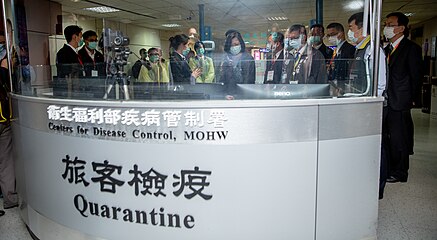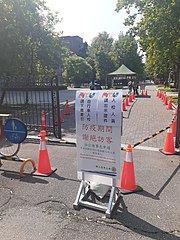
COVID-19 pandemic in Taiwan
The COVID-19 pandemic in Taiwan was a part of the worldwide pandemic of coronavirus disease 2019 (COVID-19) caused by severe acute respiratory syndrome coronavirus 2 (SARS-CoV-2). As of 19 March 2023 in Taiwan, 10,231,343 are confirmed cases, including 18,775 deaths.[1]
The virus was confirmed to have spread to Taiwan on 21 January 2020, with the first case being a 50-year-old woman who had been teaching in Wuhan, China.[6] The Taiwanese government integrated data from the national health care system, immigration, and customs authorities to aid in the identification and response to the virus. Government efforts are coordinated through the National Health Command Center (NHCC) of the Taiwan Centers for Disease Control, established to aid in disaster management for epidemics following the 2003 SARS outbreak.[7][8] The Journal of the American Medical Association says Taiwan engaged in 124 discrete action items to prevent the spread of the disease, including early screening of flights from Mainland China and the tracking of individual cases.[9][10]
Starting 19 March 2020, foreign nationals were barred from entering Taiwan with some exceptions such as those carrying out the remainder of business contracts and those holding valid Alien Resident Certificates, diplomatic credentials, or other official documentation and special permits.[11] Restrictions have since been relaxed for foreign university students and those seeking medical treatment in Taiwan, subject to prior government approval.[12][13] All who are admitted into the country must complete a fourteen-day quarantine upon arrival, except for business travelers from countries determined to be at low or moderate risk, who are subject to five- or seven-day quarantines and must submit to a COVID-19 test.[14][15]
In response to the worldwide spike in cases in October and November 2020, Taiwan announced that all travelers to and transiting through Taiwan, regardless of nationality, origin, or purpose, must submit a negative COVID-19 test performed within three working days of arrival.[16][17][18][19] Exceptions are granted to travelers responding to family emergencies or arriving from countries where on-demand or self-paid tests are unavailable, but they are required to be seated apart from other passengers and take a self-paid test immediately on arrival in Taiwan.[20]
In 2020, the pandemic had a smaller impact in Taiwan than in most other industrialized countries, with a total of seven deaths.[21][22] The number of active cases in this first wave peaked on 6 April 2020 at 307 cases, the overwhelming majority of which were imported.[23] Taiwan's handling of the outbreak has received international praise for its effectiveness in quarantining people.[10][24]
However, an outbreak among Taiwanese crew members of the state-owned China Airlines in late April 2021 led to a sharp surge in cases, mainly in the Greater Taipei area, from mid May. In response, the closure of all schools in the area from kindergarten to high schools was mandated for two weeks, and national borders were closed for at least a month to those without a residence permit, among other measures.[25] In addition to a low testing rate and the recent shortening of the quarantine period for pilots to just three days,[26] Taiwanese medical experts said that they had expected the flare-up due to the emergence of more transmissible variants of the coronavirus (the Alpha variant was found in many of those linked to the China Airlines cluster[26]), combined with the slow progress of Taiwan's vaccination campaign. Critics linked the latter issue to several factors, including Taiwan's strategy of focusing on its own vaccine development and production, making it less ready to quickly buy overseas vaccines once those became available; and hesitation among residents to get vaccinated due to previously low case numbers.[27] Additionally, heavy reporting on rare side effects of the AstraZeneca vaccine was believed to have played a role. Demand for vaccines greatly increased, however, with the surge in cases from May 2021.[28]
Domestic response[edit]
In an opinion poll conducted by Taiwan's TVBS published on 26 March 2020, health minister Chen Shih-chung received an approval rating of 91%, much higher than any other Taiwanese politician, including Tsai Ing-wen.[353] Taiwanese are particularly reassured by Chen's swift response, timely orders and candid communication style.[354] In the same TVBS poll, 84% of respondents approved of COVID-19 measures taken by the Tsai administration.[353] In another poll conducted by the Taiwanese Public Opinion Foundation after the government's inauguration of the second term shows a 71% approval rate of Tsai Ing-wen's handling of national affairs, 69% faithfulness of the DPP government, and 55% satisfactory of the government's financial relief measures.[355]



